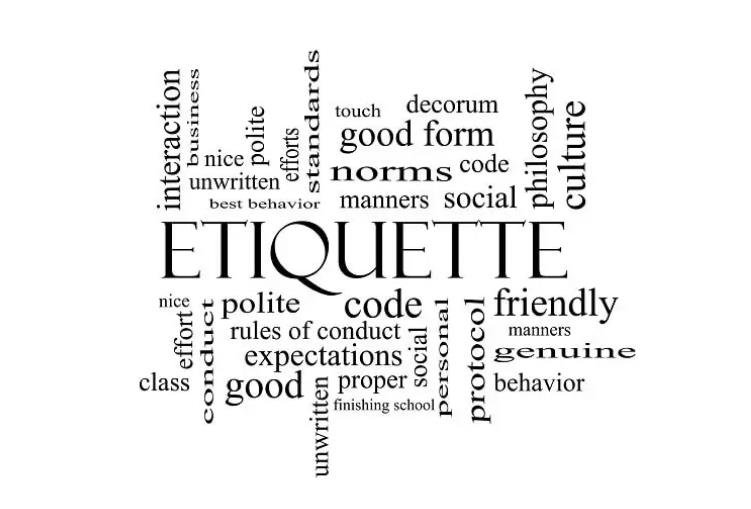Etiquette is the set of conventional rules of personal behavior in polite society.
Usually in the form of an ethical code that delineates the expected and accepted social behaviors that accord with the conventions and norms observed by a society, a social class, or a social group.
You can say “Etiquette” is merely a set of guidelines for politeness and good manners, the kindnesses with which we should always treat each other. It will always matter! Etiquette, the complex network of rules that govern good behavior and our social and business interactions, is always evolving and changing as society changes.
The word “Etiquette” comes from the French word “etiqueta”
The French word “etiqueta” means “ticket” or “label attached to something for identification.”.
In 16th-century Spain, the French word was borrowed (and altered to “etiqueta”). To refer to the written protocols describing orders of precedence and behavior demanded of those who appeared at court.
Eventually, “etiqueta” came to be applied to the court ceremonies themselves as well as the documents which outlined the requirements for them. Interestingly, this then led to French speakers of the time attributing the second sense of “proper behavior” to their étiquette,
And in the middle of the 18th century English speakers finally adopted both the words
The Ancient Egyptian vizier Ptahhotep wrote The Maxims of Ptahhotep (2375–2350 BC).
A didactic book of precepts extolling civil virtues, such as truthfulness, self-control, and kindness towards other people.
Recurrent thematic motifs in the maxims include learning by listening to other people. Being mindful of the imperfection of human knowledge, and avoiding open conflict, whenever possible, should not be considered a weakness.
That the pursuit of justice should be foremost.
Yet acknowledged that, in human affairs, the command of a god ultimately prevails in all matters; thus some of Ptahhotep’s maxims indicate a person’s correct behaviors in the presence of great personages (political, military, religious). Instructions on how to choose the right master and how to serve him.
Moreover, other maxims teach the correct way to be a leader through openness and kindness. That greed is the base of all evil and should be guarded against. And that generosity towards family and friends is praiseworthy.
Confucius (551–479 BC) was a Chinese intellectual and philosopher.
Whose works emphasized personal and governmental morality. The correctness of social relationships, the pursuit of justice in personal dealings, and sincerity in all personal relations.
Baldassare Castiglione (1478–1529), count of Casatico, was an Italian courtier and diplomat, soldier, and author of The Book of the Courtier (1528).
An exemplar courtesy book dealing with questions of the etiquette and morality of the courtier during the Italian Renaissance.
Louis XIV (1638–1715), King of France.
Used a codified etiquette to tame the French nobility and assert his supremacy as the absolute monarch of France.
In consequence, the ceremonious royal court favorably impressed foreign dignitaries whom the king received at the seat of the French government, the Palace of Versailles, to the southwest of Paris.
Etiquette reflects our cultural norms, generally accepted ethical codes, and the rules of various groups we belong to. It helps us show respect and consideration to others and makes others glad that we are with them.
Without etiquette, members of society would show far too much impatience and disrespect for one another. Which would lead to insults, dishonesty, cheating, road rage, fistfights, and a rash of other unfortunate incidents


